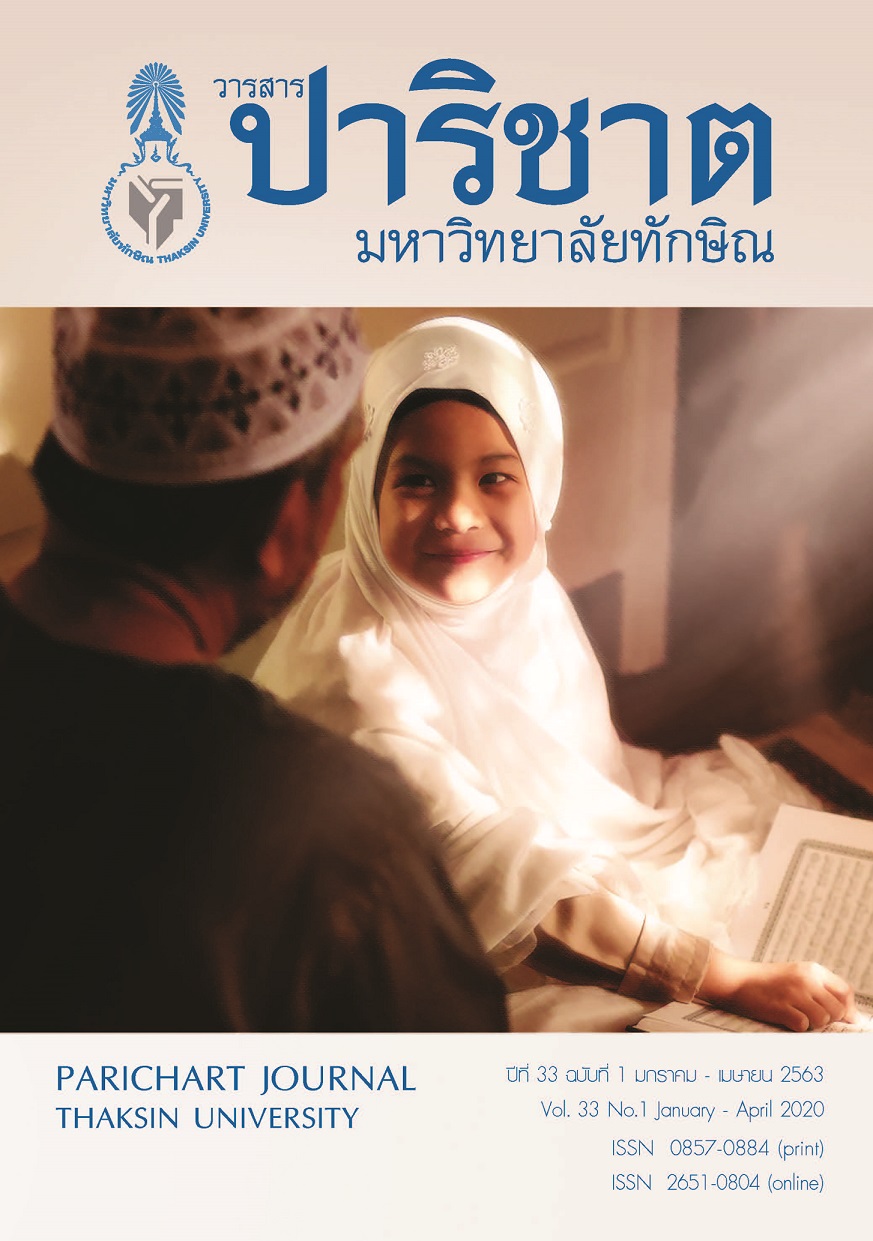Family: The Social Key Institutions and Roles of Holistic Human Development
Main Article Content
Abstract
Family is a major social institution in the society that is firstly important to role
personnel development, for self and social development. Especially in the age of current social change, the existence and expression of status and roles of family is always changed, adapted, and it causes the new patterns of conditions or family problems. However, family institution has still had to run and maintain the characteristics in presenting the structure of social relationship influencing on propulsion, creation of personal identities, being the machinery to bring people’s quality of life and encouraging the well-being in the society, in which the family institution has to encourage the generation of new quality members, physical and
mental strength, high intelligence, social adaptation skills and good soul. On the other hand, it is also like an important crucible used to enhance people for the holistic development as the perfectly human capital.
Article Details
References
Talcott, P. (1995). Family structure and the socialization of child in family, socialization and interaction process, edited by T. Parsons and R.F,Bales New York: Free Press.
Adsakul, S. (2012). Introduction to sociology. Bangkok: Chulalongkorn University Press. (In Thai)
Tinnakul, N. (2008). Social and cultural change. Bangkok: Active Print. (In Thai)
Sukanseen, W. (2005). Globalization. Bangkok: Committees of National Research Council of Thailand Program in Sociology, National Research Council of Thailand. (In Thai)
Sujjanan, J. (2013). Education and community development in 21st Century. Bangkok: Odeon Store. (In Thai)
Apichartabud, A., & Tripitak, S. (2015). Threat: Survival of Thai family on change trend. National Family Conference 2015. (online). Retrieved on November 8, 2018, from https://www. siamedunews. com/ articles/42237672/index.php?mo=24. (In Thai)
Supap, S. (2003). Sociology. Bangkok: Thai Watana Panich. (In Thai)
Wechwithan, P. (2014). Introduction to family theory. Bangkok: Pappim. (In Thai)
Adsakul, S. (2000). Family institute development and change. Bangkok: Chulalongkorn University Press. (In Thai)
Itsarapakdee, P. (2017). How have Thai family characteristics changed in the past twenty years?. The Journal of Population and Development, Institute for Population and Social Research, Mahidol University, 37(4), 1-2. (In Thai)
Project of Information Management for Women and Family. (2007). Policies and development strategies of family institute B.E. 2547-2556. Office of Women Affairs and Family Development, The Ministry of Social Development and Human Security. (In Thai)
Phosita, C. (2011). Change of Thai family and household: What do we (not) know?. (online). Retrieved on November 8, 2018, from https://www2.ipsr.mahidol.ac.th/ConferenceVII/ Download/2011-Article-02.pdf. (In Thai)
Healthy Child and Youth Promotion Section. (2017). Situation report of child, youth and family in 2017. Healthy Child, Youth, and Family Promotion Section. (Section 4) Thai Health Promotion Foundation (Thai Health). (online). Retrieved November 8, 2018, from https://drive.google.com/file/d/1lJuKlpkGs W3ZfnxvdBIeSVndjWNPECyz/view. (In Thai)
Kulphadol, P. (2012). Structural family counseling: Sustainable family development strategies. Journal of Education, 23(2), 24-32. (In Thai)
Padungyam, M., Pol-in, S., & Chuchuen, W. (2016). Perception of holistic health status among teenage mothers, their families and social circumstance in Phetchaburi Province, Thailand. EAU HERITAGE JOURNAL Science and Technology, 10(2), 250-261. (In Thai)
National Statistical Office. (2018). Divorce statistic by region and province 2008-2017. (online). Retrieved on November 28, 2018, from https://statbbi.nso.go.th/staticreport/page/ sector/th/01.aspx. (In Thai)
Department of Mental Health. (2018). Unlock teen mom to have place in society. (online). Retrieved on November 28, 2018, from https://www.dmh.go.th/news-dmh/view.asp?id=24561. (In Thai)
Natrujirote, W. (2017). Alternative family and the existing of family institution. Veridian E-Journal, Silpakorn University Thai Version in Humanities and Social Sciences, 10(2), 1817-1827. (In Thai)
Sutra, P. (2004). Status of family studies. Bangkok: Hat Yai Aekkasarn. (In Thai)
Denduang, S, & Denduang, N. (2015). Family problems and conflict between “work” and “family” in globalization. Bangkok: The Agricultural Co-operative Federation of Thailand., LTD. (In Thai)
Mungkung, W., Wacharasin, C., & Deoisres, W.. (2016). Family factors influencing substance abuse in male adolescents at a Juvenile Vocational Training Centre. The Public Health Journal of Burapha University, 11(2), 53-63. (In Thai)
Polsri, S. (2002). Theories and principles of community development. Bangkok: Odeon Store. (In Thai)
Carter J. Haynes. (2009). Holistic human development. Journal of Adult Development: J ADULT DEV (2009) 16(1); 53-60. DOI: 10.1007/s10804-009-9052-4.
Arpanantikul, M., Putwatana, P., & Wittayasooporn, J. (2011). Health situation and health practice of Thai nursing students. Thai Journal of Nursing Council, 26(4), 123-136. (In Thai)
Panyawong, K., & Pruksunan, P. (2012). Teaching publication of SE4001 holistic health care. Khon Kaen: The Faculty of Liberal Arts, Community Health Management Program, Learning Institute for Everyone. (In Thai)
Office of the National Education Commission. (2000). Summary Report of Lifelong Learning Strategy Seminar. Bangkok: Office of Education Council. (In Thai)
Udom, C., Sachdev, H., Phaiboonrattananon, N., & Butchiwan P. (2016). Social key institutions and the linkage of youth development. Phranakhon Rajabhat Research Journal (Humanities and Social Sciences), 11(2), 227-237. (In Thai)
The United Nations Development Program in Thailand. (2009). Report of human development in Thailand in 2009. Bangkok: The United Nations Development Program in Thailand. (In Thai)
Panitch, W. (Nathsupha, C.: Editor). (2013). With love No.3 familying and community in Thai society. Bangkok: Darn Sutha Press. (In Thai)
Amornwiwat, S. (1995). Family roles towards moral and cultural development in family development. Bangkok: Family Committee, Thai National Commission on Woman’s Affairs, The Office of the Permanent Secretary, the Prime Minister’s Office.
Wannarachu, N. (2001). Family: Parents are leader. Bangkok: S. Asia Press. (In Thai)
Chaiharncharnchai, P. (2015). Perceived closeness and self-disclosure in adolescents. Journal of Communication Arts, 33(2), 107-120. (In Thai)
Kaewkaewpan, W. (2017). Family relationships with problem of delinquency in adolescence. Veridian
E-Journal, Silpakorn University, Thai Version, Humanities and Social Sciences and Arts Program, 10(1), 361-371. (In Thai)
Yimsakul, P. (2018). An enhancement of family roles of educational students, Dhonburi Rajabhat University. Dhonburi Rajabhat University Journal, 12(1), 110-122. (In Thai)
Oshiai, E., & Ueno, K. (Editor). (2011). Ways of Asian family in 21st century. Bangkok: Chulalongkorn University Press. (In Thai)
Apichartabud, A. (2015). Threat: Survival of Thai family on change trend. National Family Conference 2015. (online). Retrieved on November 8, 2018, from https://www.siamedunews.com/ articles/ 42237672/index.php? mo=24. (In Thai)


